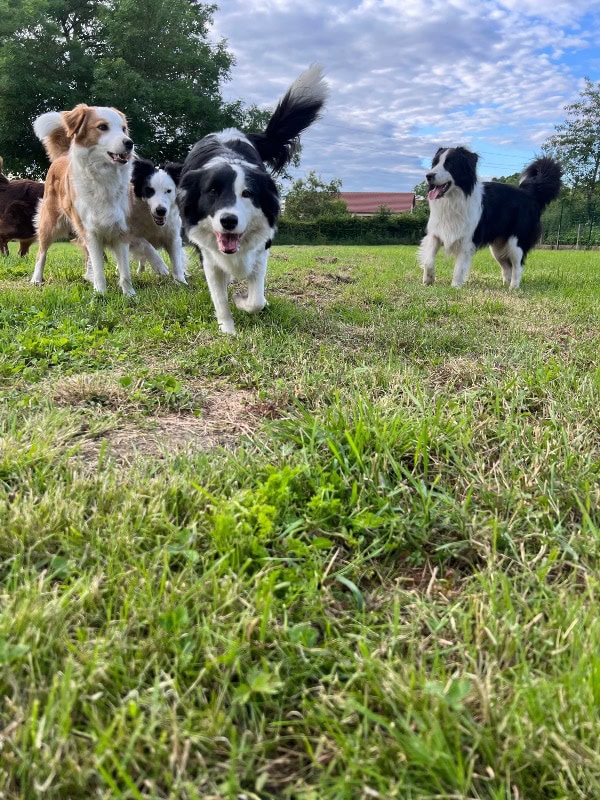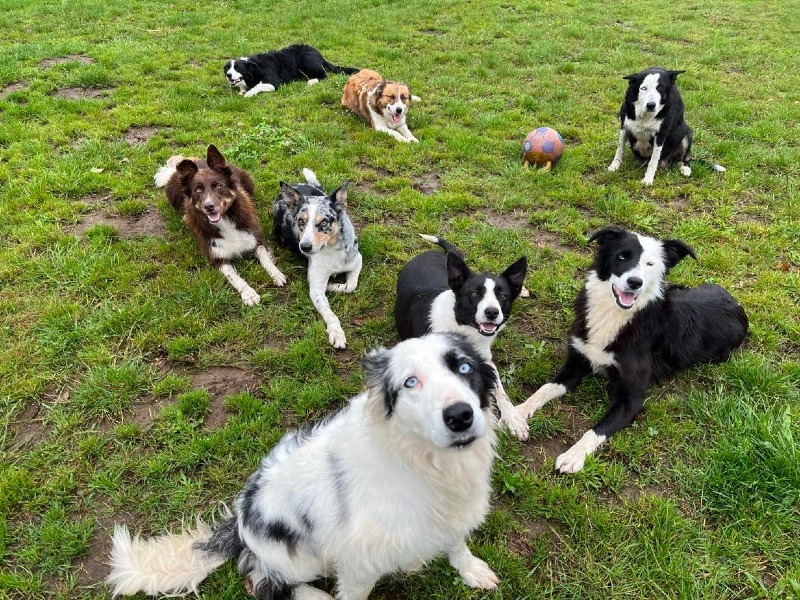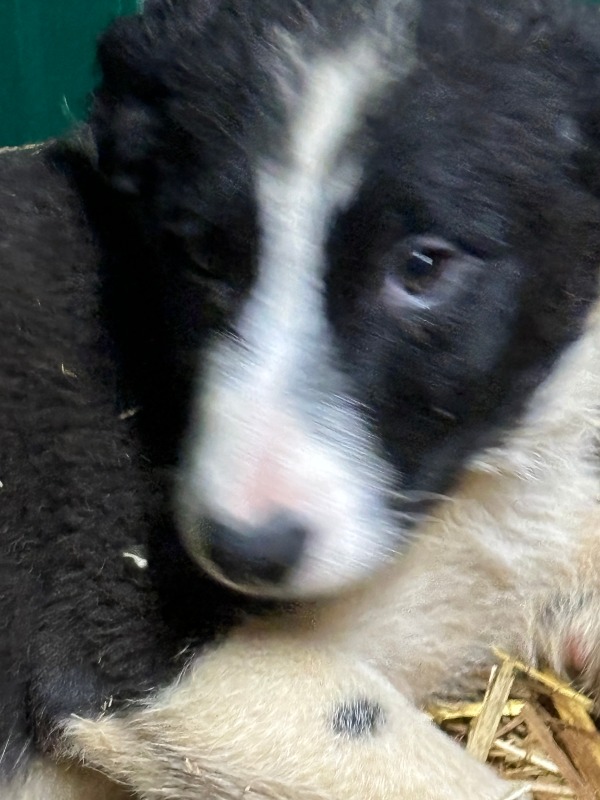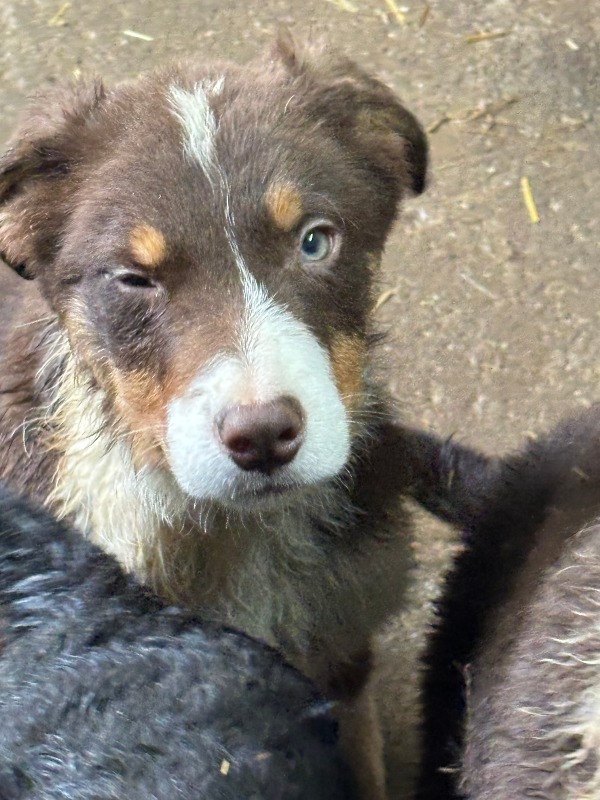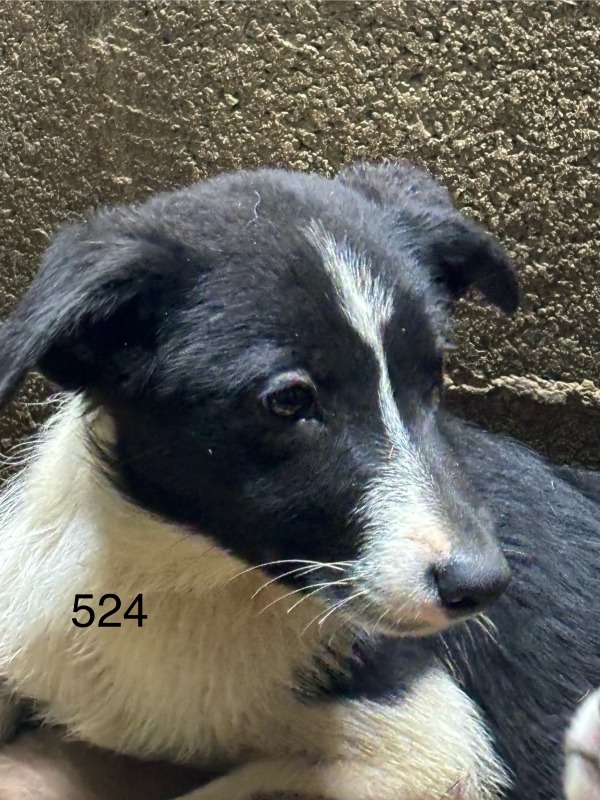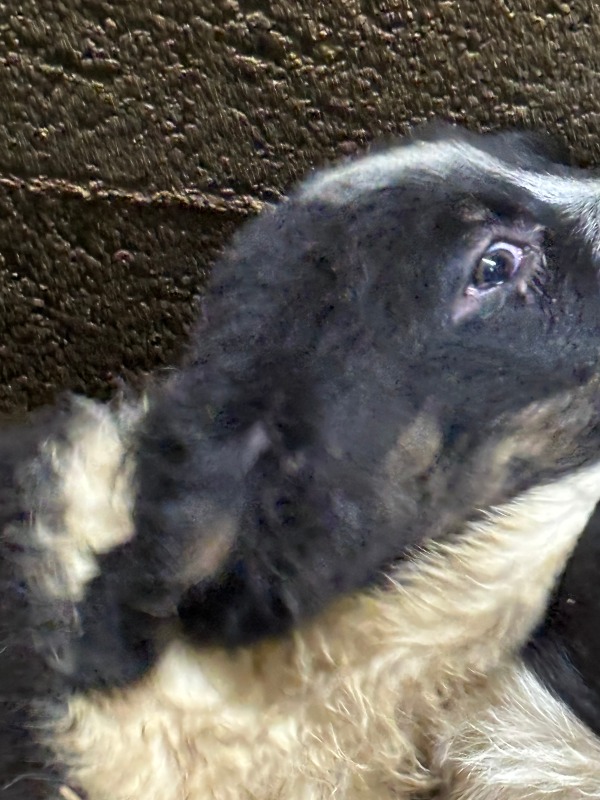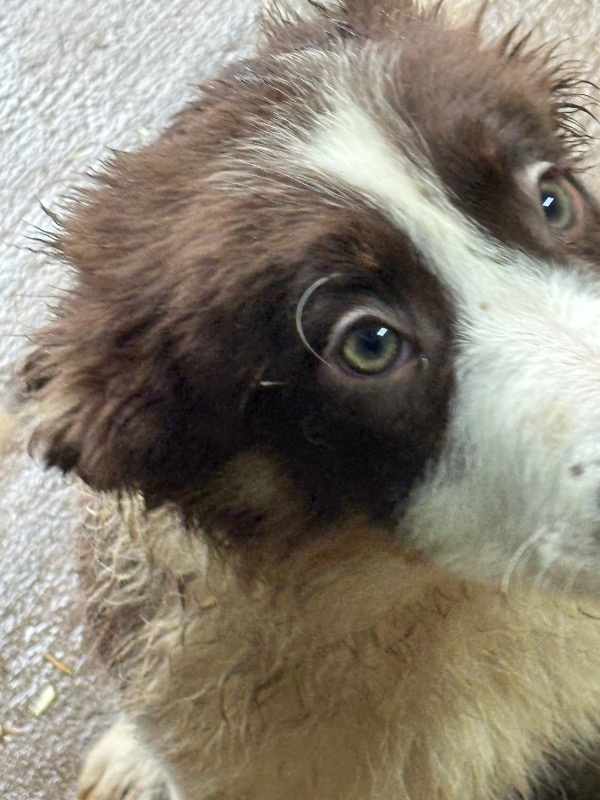Border collie
Autres noms : Borders, Rough collie
Discover the Border Collie, an exceptionally intelligent and agile dog breed known for its herding instinct. Ideal for active families, this loyal companion is also recognized for its quick learning ability and boundless energy.
Awareness of acquiring an animal
Adopting or breeding a dog is a responsibility that must be carefully considered. Dogs are loyal companions that require time, attention, and constant care. Whether for leisure, passion, or professional breeding, it is crucial to understand the specific needs of each breed. Provide them with a loving and stimulating environment, and avoid any impulsive acquisition that could harm their well-being. Be a vigilant and committed owner for a happy and healthy companion.
To learn more about animal welfare, we invite you to consult our FAQ by clicking the button below:
Origins and history
The Border Collie is a dog breed that originates from the border regions of Scotland and England, where it was primarily developed for herding livestock. Its lineage traces back to traditional shepherd dogs used to gather and guard sheep in the rugged terrains of these areas. Breeders played a crucial role in selecting dogs with exceptional working abilities, which led to the development of a particularly intelligent and energetic type of dog.
In the 19th century, the breed began to be recognized more formally, especially due to the growing interest in agility and herding competitions. The Border Collie's distinctive traits, such as its agility, intelligence, and high learning capacity, have made it a favored choice among breeders and trainers. These qualities are often highlighted in competitions, where the Border Collie excels in various events.
Today, this dog is widely appreciated not only for its working abilities but also as a loyal and active companion. Its popularity has led to a great diversity of lines, each with its own characteristics suited for both work and leisure. Its reputation as one of the most intelligent breeds makes it a highly sought-after pet.
Physical characteristics
The Border Collie is a dog breed known for its athletic and elegant appearance. Its height typically ranges from 46 to 56 centimeters at the shoulder, with a weight between 12 and 24 kilograms, making it a medium-sized dog. This breed is distinguished by its muscular build and agility, allowing for excellent performance in various canine activities.
Its coat is double and can vary in length, ranging from short to long. The outer layer is generally smooth or slightly wavy, while the undercoat is dense, providing good protection against the elements. The coat colors are highly varied, including black, red, merle, and combinations of these shades with white markings. The tail is fairly long, often carried low, and may have a slight curve.
The eyes of the Border Collie are expressive and can come in different colors, ranging from brown to blue, and even heterochromatic. Its poise and intelligence make it a highly agile companion, always ready for work or play. This dog has a bright and attentive gaze, characteristic of the herding dogs it is. Its ears can be semi-erect or floppy, adding to its charm. This breed stands out for its ability to move with ease and speed, making it an ideal partner for outdoor physical activities.
Character
The Border Collie is known for its exceptional intelligence and ability to learn quickly. This breed is often considered one of the smartest, thanks to its memory and capacity to assimilate new commands and techniques. This intelligence makes it an excellent candidate for canine sports and obedience competitions. The enthusiasm and motivation of this dog to work with its humans are standout traits, allowing it to thrive in a stimulating environment.
In addition to its intelligence, the Border Collie is also extremely energetic and active. It requires regular and stimulating physical activities to avoid boredom, which can often lead to undesirable behaviors. Long walks, interactive games, and agility training are ideal ways to meet its physical and mental needs.
Socially, the Border Collie is often affectionate and loyal to its family. While it may sometimes be wary of strangers, it develops close bonds with its owners. Its protective nature and herding instinct result in constant vigilance. It is essential to provide early socialization so that it can interact harmoniously with other dogs and people.
Finally, the Border Collie is a dog that requires a commitment of time and energy from its owners. Its lively and attentive personality makes it an ideal companion for those who enjoy spending time outdoors and working together on constructive activities. In summary, this breed is perfect for active families ready to provide the attention and challenges it needs.
Life expectancy
The life expectancy of a border collie is generally between 12 and 15 years. This criterion is influenced by various factors, including genetics, diet, physical exercise, and veterinary care.
Border collies are known for their great vitality and intelligence. They require regular physical and mental activity, which helps maintain their overall health and prolong their lifespan. An active lifestyle, combined with a balanced diet, is essential to prevent obesity and other common health issues.
Preventive health care also plays a crucial role. Regular visits to the veterinarian, vaccinations, and screenings for specific hereditary diseases can help identify and treat potential health problems early. Border collies can be prone to certain hereditary conditions, such as eye issues and joint disorders, which underscores the importance of choosing a responsible breeder.
Finally, the environment and emotional well-being are determining factors in the lifespan of these dogs. An affectionate and stimulating living environment can significantly enhance their quality of life, thereby contributing to a maximum lifespan. When properly cared for, border collies can live long and healthy lives, providing many years of companionship.
Exercise and activity needs
The Border Collie is a particularly active dog breed, recognized for its intelligence and boundless energy. The exercise needs of this breed are considerable. On average, a Border Collie requires about 1.5 to 2 hours of physical activity per day. This can include walks, runs, interactive games, and agility sessions. Mental stimulation is equally crucial, as this breed excels in tasks that require thinking and learning.
Activities such as obedience, frisbee, or search games are ideal for meeting their physical and mental needs. They also perform very well in canine sports like agility or flyball, which engage their minds while keeping them fit. Ignoring these needs can lead to destructive behaviors, as an under-stimulated Border Collie may become anxious or hyperactive.
Finally, it is essential to diversify the activities offered to avoid monotony. Incorporating new challenges, such as training tricks or exploring new environments, contributes to their well-being. In summary, a Border Collie requires daily commitment in terms of exercise and stimulation to ensure its physical and mental well-being.
Recommended diet
The diet of a border collie is crucial for its health and well-being, as this breed is very active and energetic. A balanced diet should include high-quality proteins, which are essential for maintaining muscle mass. Ideally, protein sources should come from lean meats such as chicken, beef, or fish.
In addition to proteins, complex carbohydrates like brown rice or sweet potatoes provide the necessary energy for daily activities. Fiber, coming from vegetables like carrots or peas, is also important for good digestion. It is advisable to avoid refined grains, as they can cause digestive issues.
Hydration is another essential aspect of the diet. Ensure that your dog always has access to fresh water. Supplements such as omega-3 fatty acids can also be beneficial for skin and coat health. Finally, it is better to divide daily meals into two or three portions to avoid digestive problems and maintain a consistent energy level.
Training and obedience
The Border Collie is recognized as one of the most intelligent and energetic breeds. To ensure optimal development, it is essential to adopt an appropriate training approach. Socialization from a young age is crucial. Exposing the puppy to various people, animals, and environments helps to build its confidence and prevent potential fear-based behaviors in adulthood.
Another fundamental aspect is working on basic obedience. Border Collies respond well to positive training, which includes rewards such as treats or praise. When kept mentally stimulated, these dogs quickly learn new commands. To reinforce learning, it is recommended to avoid extended training sessions. Short, repeated sessions are more effective.
Finally, the need for physical and mental exercise is paramount. Activities such as agility, frisbee, or even search games not only stimulate their body but also their mind. A Border Collie that receives enough exercise will be more attentive and receptive during training. Thus, education and physical activity go hand in hand to ensure a good balance and a harmonious life.
Behavior with children
Border Collies are often recognized for their intelligence and liveliness, which influences their behavior with children. They are generally very affectionate and can form strong bonds with young ones. Their energetic nature encourages them to play and interact, making them ideal companions for active children. They enjoy outdoor games like frisbee or running, providing an excellent opportunity for children to expend their energy.
However, their high need for exercise and mental stimulation should be taken into account. An under-exercised Border Collie can become hyperactive or develop undesirable behaviors. Therefore, it is essential to ensure they have plenty of activities to channel their energy. Children learning to interact gently and respectfully with the dog will contribute to a harmonious relationship.
Furthermore, early socialization is crucial. A well-socialized Border Collie that has been exposed to children from a young age will be more comfortable and patient in its interactions. By promoting positive training and establishing clear rules, the time spent together can be enriching for both the dog and the children.
Compatibility with Other Animals
The Border Collie is renowned for its intelligence, energy, and working instincts. When it comes to compatibility with other pets, several factors need to be considered. In general, these dogs are sociable and can get along with other animals. However, their herding instinct can pose challenges, especially with smaller or slower animals, such as cats or rodents.
Training and socialization from a young age play a crucial role. A well-socialized Border Collie will know how to interact positively with other animals, but it's essential to monitor interactions, particularly in the beginning. These dogs tend to herd other animals, which can be perceived as a threat by some, causing stress or agitation.
Another important aspect concerns the energy of the Border Collie. This dog requires physical and mental activity. If its need for exercise is not met, it may become excitable or anxious, which can adversely affect its relationship with other animals. Finally, it is vital to establish clear rules and ensure that each animal has its own space to prevent any rivalry. In summary, with proper training and adequate socialization, a Border Collie can coexist harmoniously with other pets.
Grooming needs
Grooming and maintenance of border collies are essential to ensure their well-being and health. First of all, their coat requires regular brushing, ideally two to three times a week. This helps to remove dead hair, prevent the formation of mats, and reduce shedding in the house. During the shedding period, which typically occurs in spring and autumn, daily brushing may be necessary to manage the abundance of hair.
Regarding bathing, it is recommended not to bathe them too often, usually once every two to three months, unless they are particularly dirty. A gentle shampoo specifically formulated for dogs should be used to preserve the integrity of their coat and skin.
As for nail care, it is important to trim them regularly, about once a month, to avoid any pain or injury. Ears should also be checked regularly to prevent infections. Finally, special attention should be paid to dental health by ensuring that their teeth are brushed regularly or providing suitable toys for natural teeth cleaning. Regular maintenance will help keep a border collie healthy and happy.
Health
The Border Collie is an active and intelligent dog breed, but it has certain health issues that owners should be aware of. First of all, hereditary diseases are common in this breed. The two major problems include hip dysplasia and elbow dysplasia, which can lead to pain and mobility limitations. It is essential to choose a responsible breeder who conducts genetic testing to minimize these risks.
Additionally, Border Collies are also prone to eye problems, such as cataracts and hereditary retinal neuritis. Regular check-ups with a veterinarian can help detect these conditions at an early stage and establish appropriate treatment.
Finally, since they are very active, it is crucial to monitor their physical condition. Insufficient activity can lead to obesity and behavioral problems. A balanced diet, combined with a regular exercise routine, contributes to a healthy life and meets their mental and physical needs.
Environment and habitat
The Border Collie is a dog breed that is particularly well-suited to active and dynamic environments. Originally bred for herding work, this dog needs enough space to move freely. An ideal habitat consists of a house with a fenced garden, allowing the dog to engage in its natural instincts of running and playing.
In rural areas, the Border Collie can enjoy direct access to fields and hills, which stimulates not only its body but also its mind. It requires regular activities such as walks, ball games, or agility courses to avoid boredom and behavioral problems. This is an intelligent dog that enjoys mental challenges, which is why enriching its environment with interactive toys is important.
In urban settings, the Border Collie can adapt, but it is essential to ensure frequent outings and physical stimulation. Regular visits to parks or green spaces become crucial to satisfy its socialization and exercise needs. A structured routine contributes to emotional and physical balance, ensuring a harmonious coexistence with its owners.
Name ideas
Choosing a name for a border collie is a crucial step, as it should be both memorable and suited to the personality of this dynamic breed. A good name should be short and impactful, typically made up of one or two syllables, so it can be easily recognized by the dog. It is also preferable to avoid names that sound like common commands, to prevent any confusion. When considering meaning, a name inspired by the intelligent and playful character of the border collie can add an extra dimension.
It's also interesting to consider cultural references, locations, or elements of nature that evoke traits of the breed. Additionally, associating the name with physical or behavioral traits can strengthen the bond between the name and the dog. Finally, it’s wise to test the name aloud and ensure that it is not too similar to those already used in your environment.
Here are some name suggestions for a border collie: Flash, Juno, Zen, Kiwi, Nova, Zorro, Pixel, Sage, Echo, Choco, Blaze, Fino, Dune, Vortex, and Luma. These names capture the energy and spirit of this agile and intelligent companion.
Average purchase price
The price of a purebred dog can vary significantly depending on several factors. For a border collie, the average purchase cost generally ranges between 800 and 2000 euros. This price can fluctuate based on the dog's lineage, the breeder's reputation, and specific characteristics of the dog, such as its color or competition background.
Reputable breeders who prioritize the genetic health of their animals and offer puppies from champion lines may charge higher prices. It is also important to consider that the initial cost is just one part of the expenses associated with acquiring a dog. Vaccination fees, spaying/neutering, food, and veterinary care add to the expenses to be anticipated.
Finally, it is advisable to adopt from shelters or animal protection organizations, where adoption costs are often lower while providing a new life to an animal in need. In this case, fees can generally range between 150 and 300 euros, often including vaccinations and health follow-up.
Expenses
Owning a dog of this breed involves various expenses that can be estimated based on several factors. On average, you should budget between 80 and 150 euros per month.
Food costs represent a significant portion of the budget. For an adult dog, this can range from 50 to 80 euros per month, depending on the quality of the kibble chosen and the specific needs of the animal. In addition, there are costs associated with veterinary care, including annual vaccinations, deworming, and potential visits for illnesses, which can vary significantly. On average, this can amount to about 10 to 30 euros per month if you set aside funds for preventive care.
Grooming expenses should also be considered. Although this breed requires less frequent grooming, it is wise to budget around 20 to 40 euros monthly for regular maintenance. Finally, it’s important to include budgets for equipment (toys, bedding, accessories), training classes, and walks if necessary, which could easily add an additional 20 to 30 euros per month.
In conclusion, a reasonable total monthly budget falls between 80 and 150 euros, depending on the choices and specific needs of the animal.
Destination and usage
The Border Collie is renowned for its lively personality and exceptional intelligence, making it a top choice as a pet. They are often adopted by families looking for an active dog, as their need for exercise and mental stimulation is high. This breed thrives in environments where it can expend energy, whether in a spacious yard or during regular walks. Their affinity for play and outdoor activities makes them particularly well-suited for dynamic families.
These dogs are also valued for their ability to form strong bonds with their owners. Their affectionate nature and desire to please make them loyal companions. They easily become attached and are often true family members, participating in many daily activities. Due to their intelligence, they can be trained to perform various tricks and behave harmoniously in a home setting.
Finally, the Border Collie is an excellent choice for those wishing to engage in canine activities. With proper training, they can excel in disciplines such as agility or obedience, providing opportunities to strengthen the bond between owner and dog. Border Collies, as pets, bring vibrant energy, unwavering loyalty, and genuine joy to everyday life.
Legislation and regulation
The legislation regarding the Border Collie dog breed varies significantly from country to country, reflecting cultural contexts and attitudes towards animals. In several European countries, there are generally no specific laws prohibiting this breed, which is often appreciated for its intelligence and herding skills. However, animal welfare regulations may impose strict conditions for breeding and owning dogs, including requirements for socialization and training.
In other parts of the world, such as certain areas of the United States, dog legislation focuses more on the behavior of animals and their impact on the community. Border Collies, being active dogs that require mental and physical stimulation, are often encouraged in environments where their working nature can be valued, such as in dog sports. However, in places where dangerous dog laws apply, considerations may arise regarding how a Border Collie is socialized and trained to prevent any problematic behavior.
In Asia, attitudes towards specific breeds can also vary. In some countries, Border Collies are becoming increasingly popular among families looking for an active companion, while in others, restrictions on certain breeds may limit their adoption. Awareness initiatives promote a better understanding of the behavioral and physical needs of the breed, highlighting the importance of appropriate education.
Finally, regulation regarding this breed often includes discussions about the rights of responsible owners. These owners must be aware of local laws governing their health, safety, and welfare. Responsible adoption, compliance with regulations in public spaces, and understanding the specific needs of the Border Collie are essential for ensuring a harmonious coexistence.
Official recognition
The official recognition of Border Collies varies significantly from country to country. In many countries, this breed is recognized by major canine organizations, such as the Fédération Cynologique Internationale (FCI) and the American Kennel Club (AKC). These organizations establish breed standards that define the expected physical and behavioral characteristics of dogs of this lineage.
In some countries, such as the United Kingdom and the United States, Border Collies are popular as working and competition dogs. They are often employed in activities such as herding and dog sports, which contributes to their recognition within the canine and agricultural communities. Local breed clubs organize shows and competitions to promote the breed and educate the public about its specific needs.
However, in other regions, recognition may be less formal. Border Collies may be bred for their working abilities rather than to adhere to specific standards. This results in variability in the appearance and behavior of the dogs, making uniform recognition difficult. Consequently, the understanding and appreciation of this breed largely depend on the cultural context and local traditions regarding working dogs.
Pedigrees
To obtain a pedigree for a Border Collie, it is essential to go through recognized organizations that manage dog genealogy. In France, the Société Centrale Canine (SCC) is the official body responsible for maintaining the records of purebred dogs. It issues birth certificates that establish a pedigree. Breeders must be accredited by the SCC for the puppies to receive this document attesting to their purebred status.
Internationally, the Fédération Cynologique Internationale (FCI) is the entity that coordinates the activities of various national organizations. Regional Border Collie clubs, which are often affiliated with the FCI, also play a crucial role. They organize shows, exhibitions, and the recognition of breeders. These associations can offer health passports and genetic testing, thereby enhancing the value of the pedigree.
It is recommended that Border Collie owners gather information about specific breed clubs, as these also provide resources for working and breeding tests, contributing to the preservation of the breed's characteristics.
Prohibitions
Border collies, renowned working dogs known for their intelligence and agility, are generally well accepted in many countries. However, there are variabilities in regulations related to concerns about the behavior or living conditions of these animals. In some countries, laws regarding specific breeds mainly focus on animals deemed dangerous, but restrictions have been observed concerning the ownership of dogs that exhibit particular characteristics, including working dogs.
In regions where border collies are frequently employed for herding, they often benefit from certain protections due to their role in agriculture. However, concerns arise in urban environments where a lack of space and exercise can lead to behavioral issues. Some municipalities then impose restrictions on the adoption or ownership of these animals, making it necessary for owners to obtain a permit or specific training.
Globally, bans on border collies remain rare, but owner responsibility is crucial. It is essential for owners to understand the specific needs of the breed to avoid problematic interactions with third parties or other animals. Regulations and laws may therefore vary, highlighting the importance of awareness and education for owners regarding their animal's behavior and well-being.
Breeders of Border collie
Want to see more breeders of Border collie?
Check out the page of our directory listing all breeders of Border collieClassified Ads of Border collie
Breed clubs of border collie
No of border collie breed clubs are currently registered on Preeders.
If you would like to highlight your breed club, sign up for free now and be the first to appear on this page.

